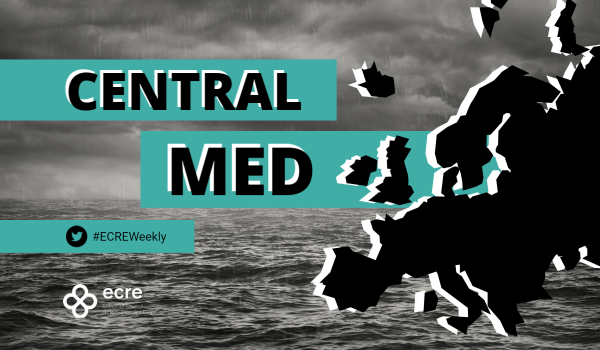Civilian search and rescue operators have conducted numerous operations in the Mediterranean over the past week saving hundreds of lives. Deaths have been reported off Italy and Tunisia while interceptions and returns to unsafe Libya continue.
In a series of operations on the Mediterranean between 9 and 12 May the Geo Barents vessel operated by Médecins Sans Frontières (MSF Sea) rescued 470 lives. On 9 May MSF Sea reported the rescue of roughly 200 people from two boats in distress with the so-called: “Libyan Coast Guard navigating at a very close distance”. The following day the Geo Barents crew: “were able to locate and rescue a rubber boat in distress with 59 people on board”, after being alerted by the NGO hotline Alarm Phone and with the assistance of Pilotes Volontaires. On 11 May: “Over the course of a 5 hour operation,” MSF Sea “carried out 2 further rescues” of 111 survivors sailing in rubber boats. According to the organisation: “rescues in the Maltese SAR exposed once again the inaction of the Maltese authorities against their obligations to provide assistance to boats in distress”. Maltese reluctance to conduct rescues was also at full display between 6 May when Alarm Phone first reported of 34 people in distress of Benghazi and 9 May when they were finally rescued by the cargo vessel BSG Bahamas and Sea-Eye, in an operation coordinated by German authorities, after they survived for days in rough seas in the Maltese SAR zone. The German container ship, Berlin Express was the first to arrive on the scene – unable to conduct a rescue operation due to rough seas the crew launched a life raft and provided food and water to the people in distress. German authorities contacted the civilian rescue operator Sea-Eye and despite its vessel MV Sea Eye 4 being located east of Tripoli at a distance of 40 hours it reached the scene and took the survivors on board. “Without the crews of the Berlin Express and the Bahamas, the people would have had no chance to survive. They would have died of thirst or drowned,” said Gorden Isler, chairman of Sea-Eye. V. According to the organisation: “It should not have come that far. The distress case finally occurred in the Maltese search and rescue zone. Once again, Malta refused responsibility and coordination, so the German rescue coordination centre in Bremen was forced to coordinate a distress call in the Mediterranean”. On 7 May the Rescue Coordination Centre (RCC) of Malta rejected calls to intervene by Alarm Phone insisting the boat was adrift in international waters and despite repeated alerts from the NGO hotline a representative of the Armed Forces of Malta told Times of Malta: “We have no information on the matter so far”. On 12 May Alarm Phone again reported of Maltese authorities ignoring alerts off a group of 24 people in distress in the Maltese SAR zone. On 9 May Sea-Watch International announced the second recent rescue by its vessel Sea-Watch 4 operated by the United4Rescue alliance, stating: “last night, our crew rescued 88 people from distress at sea. We now have a total of 145 guests onboard”.
Media reported on 7 May of the Italian Coast Guard rescuing more than 100 people and recovering two bodies after a sailboat ran aground near a jetty in southern Italy. The boat was reportedly carrying a total of 108 people and police and coast guard helicopters were unable to recover other survivors or bodies. On 12 May other media reported of the Tunisian Coast Guard recovering the bodies of three migrants whose boat sank off Tunisia and rescuing another 250 lives in several operations. “Coastguard rescued 240 African migrants and eight Tunisians in 10 illegal migration trips, and also recovered the bodies of three Africans whose boat sank off the coast of El Awabed in Sfax Governorate,” Lieutenant-Colonel Ali Ayari stated. On May 12 Alarm Phone reported of 70 people in distress on a sinking boat off Libya.
On 6 May the Protocol and Information Office, headed by the Chief of Staff of the Libyan Naval Forces, announced that Turkish naval forces had rescued 17 people of different African nationalities northwest of the city of Misrata. Special Envoy for the Western & Central Mediterranean situation for the Un Refugee Agency (UNHCR), Vincent Cochetel thanked Turkey for the rescue but warned that: “the return to Libya exposes migrants & refugees to serious human rights abuses. No return to Libya should be contemplated as long as the situation for migrants & refugees do not improve”. EU has been criticised over its complicity in severe human rights violations in Libya. An analysis of the EU Emergency Trust Fund for Africa (EUTF) published on 9 May by Voxeurob refers to a Deutsche Welle investigation revealing that: “the primary category for funding allocation is migration management, with 24% of all resources allocated. Projects range from support for the Libyan coast guard (despite allegations of grave human rights violations against people intercepted at sea and detained in Libya), to schemes for “voluntary” returns of migrants”. In a blog also published on 9 May spokesperson for Amnesty International Italy, Richard Noury describes how a militia created by the government of Libya in January 2021 and receiving state funds is responsible for unlawful killings, arbitrary detention of Libyan citizens, wiretapping and subsequent arbitrary detention of migrants and refugees, torture, forced labour and other very serious crimes under international law.
According to the International Organization for Migration (IOM) 254 migrants were intercepted at sea and returned to Libya In the period from 1 to 7 May and the total in 2022 is 4,715 including 188 children.
For further information:
- ECRE, Search and Rescue: UNHCR Call for Urgent Action over Deaths at Sea, Meanwhile Deaths Continue on the Mediterranean and Atlantic Routes, May 2022
This article appeared in the ECRE Weekly Bulletin. You can subscribe to the Weekly Bulletin here.

